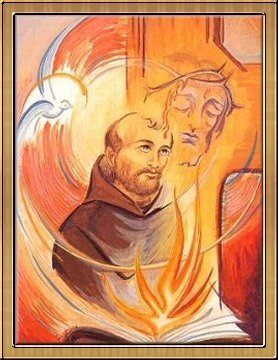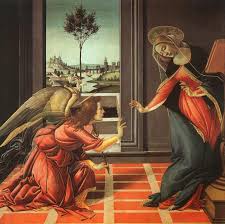
PRIEST & DOCTOR OF THE CHURCH
O God, who gave the Priest Saint John an outstanding dedication to perfect self-denial and love of the Cross, grant that, by imitating him closely at all times, we may come to contemplate eternally your glory. Through our Lord.
* * * * * *
Extraits d'une homélie pour la fête de St. Jean de la Croix (www.carmel.asso.fr)
Je sais une source, qui jaillit et s’écoule
Mais c’est au profond de la nuit.
Cette source éternelle, elle reste cachée
Mais je n’ignore pas d’où elle prend naissance,
Et c’est au profond de la nuit.
Ainsi s’exprime saint Jean de la Croix au début de sa poésie sur La Source.
Un jour, dans un de nos couvents, nous avions invité l’évêque du diocèse à l’occasion de la solennité d’une sainte du Carmel. S’adressant à l’assemblée au début de la célébration, avec quelque malice dans le regard et dans la voix, il dit ceci : « Comme évêque de ce diocèse, de cette grande ville, je n’attends rien des frères carmes, je n’ai pas besoin d’eux. Un carme ne sert à rien. »
Puis reprenant la parole, avec plus de sérieux, mais sans se départir de son sourire complice (en direction des frères), il poursuit : « Bien au contraire, j’ai absolument besoin des frères carmes. Au cœur de la ville, ils sont les gardiens d’une source à laquelle on peut venir se désaltérer. »
En tant « qu’acteurs de ce service » pour l’Eglise et le monde nous pourrions prolonger cette réflexion d’évêque et dire : en effet, l’activité principale des frères et sœurs du Carmel (religieux et laïcs) consiste à réamorcer les sources par l’oraison, à réalimenter ces nappes phréatiques, ces profondeurs de l’homme toujours exposées au risque de dessèchement, et cela, en puisant l’eau auprès de Celui qui est la Source, le Christ.
Notons que la source est cachée, de même que ceux qui la captent et l’entretiennent, qui acheminent l’eau jusqu’aux habitations. Qui d’ailleurs, dans une grande ville comme Paris, s’interroge sur la provenance de l’eau qu’il boit ?
Le Carmel s’est en quelque sorte disposé à ce service caché. Bien qu’il n’en ait pas le monopole, l’Eglise lui reconnait ce charisme particulier depuis des siècles. Aussi avons-nous à persévérer, à nous encourager, filles et fils du Carmel à demeurer fidèles à cette belle vocation….
Nous voici exactement à dix jours de la Nuit de Noël, et c’est vraiment une aubaine et une grâce de fêter saint Jean de la Croix, d’être au contact de ses écrits dans ce contexte de l’Avent, si proche de la Nativité.
Pour Jean, la nuit correspond à la nuit spirituelle de la foi, éclairée cependant de l’intérieur par cette même foi, qui, appuyée sur le Christ, est semblable à un flambeau, à un feu ; la foi éclairant comme de l’intérieur le chemin (« Au milieu d’une nuit obscure étant d’amour enflammé » écrit-il).
Le type de nuit que l’on évoquera et chantera la veille de Noël est d’un autre ordre : il s’agit de « la nuit du péché » (Cf. Edith Stein, Le mystère de Noël), du refus de Dieu et plus encore de l’ignorance, de la souffrance des hommes privés de la pleine connaissance du Seigneur.
Ainsi, « Le peuple qui marchait dans les ténèbres a vu se lever une grande lumière, sur les habitants du pays de la mort une lumière a resplendi. » (Isaïe 9, 1).
Puissions-nous unifier ces deux nuits, les aborder de façon complémentaire, comme deux solidarités à vivre avec l’humanité : la nuit qui relève du combat spirituel, selon Jean de la Croix (et beaucoup mènent de rudes combats), et celle qui nous rend proches « des joies et des espoirs, (et surtout) des tristesses et des angoisses des hommes de ce temps » (Vatican II, GS 1).
A l’invitation du Christ dans l’évangile de ce jour, puisse « notre unité », notre communion « être parfaites » afin de nous tenir devant Dieu pour tous ceux qu’Il nous a donnés à aimer et accueillir dans notre prière (Jn 17, 23-24).
fr. Gérard-Marie

* * * * * *
The Fourth Sunday of Advent (Year “B”) – December 18, 2011
THE INCARNATION: “NOTHING WILL BE IMPOSSIBLE WITH GOD”
[Texts: 2 Samuel 7.1-5, 8b-12, 14a, 16 [Psalm 89]; Romans 16.25-27; Luke 1.26-38]
Paul's epistle to the Romans ends with an extended prayer of praise to God. In it, Paul speaks of “the revelation of the mystery that was kept secret for long ages but is now disclosed”. A literal translation would be, “according to the mystery kept silent for eternal ages”.
The silence of God suggests divine majesty and—a note that Paul mentions later—celestial wisdom. “To the only wise God...be the glory forever!” As Paul claimed, God is infinitely wise, leading and guiding human beings even when his ways are inscrutable (Romans 11.33).
Paul's gospel and proclamation of Christ centre on Jesus' death and, especially, his resurrection. But the use of Paul's doxology on this Fourth Sunday of Advent points to the “incarnation”—a term more typical of John's Gospel than Paul's writings—as the rupture of God's silence concerning salvation for humanity.
Some 2000 years ago, all that had been foretold in the Old Testament (“through the prophetic writings made known to the Gentiles”) began to come into focus. But why God did not start the pivotal moment of salvation history more dramatically than with the annunciation to Mary must remain eternally a part of God's awe-inspiring silence.
However, the scriptures show God often surprising humanity by taking new initiatives. The Second Book of Samuel relates how David determined that, after all his accomplishments in battle, he would build the Lord God a fitting house (i.e., a temple) in Jerusalem. Instead, through a vision entrusted to the prophet Nathan, God refused David's offer on the grounds that he, instead, would build David a house (i.e., a family).
“The Lord declares to you, David, that the Lord will make you a house”. In addition, God promised David that “your house and your kingdom shall be made sure forever before me”.
God's promise appeared to fail with the Exile and the end of the Davidic dynasty. But prophetic utterances during and after the Exile foretold fulfilment of the promise made to David through a coming messiah, envisaged in various guises as a Spirit-filled king and/or priest.
Luke's narrative of the annunciation to Mary mentions several of the qualities Israel's prophets foretold of the coming Davidic figure: “he will be great, and will be called the Son of the Most High, and the Lord God will give to him the throne of his ancestor David... and of his kingdom there will be no end.”
In God's new beginning, the eternal dimension of David's posterity belongs now not to the dynasty but to the person who embodies it, Christ Jesus the Lord. Unlike the Davidic kings who, by their sins, proved disloyal to the covenant, this Child “will be holy; he will be called Son of God”.
Mary, to whom the angel Gabriel communicated this news, had already been prepared by God to welcome this final offspring in the Davidic line. Addressed as “favoured one” and told that “the Lord is with you”, Mary was told “do not be afraid” and asked to assent to God's invitation to conceive in her womb through the overshadowing of the Holy Spirit.
Puzzled about Gabriel's charge, Mary asked, “How can this be, since I am a virgin?” She was reassured that all this was God's doing, then given a sign that such a virginal conception could take place—the pregnancy of her relative Elizabeth, though she had been barren into old age. Gabriel concluded his message with a truth often expressed in the Scriptures, “nothing will be impossible with God”.
Mary's yes to God's call (“Here am I, the servant of the Lord; let it be with me according to your word”) stands as a model for each believer's response to God's silence-breaking initiatives, especially as these are discovered in the Advent season.
Blessed Pope John Paul noted that “Advent is a Marian time par excellence because Mary is the one who, in an exemplary way, waited for and listened to the Son of God made man. May the Holy Virgin help us open the doors of the heart to Christ, Redeemer of man and history.... May she encourage us to wait for the Lord, sharing our time and energies with those who are in need.”
Your Grace,
ReplyDeleteThe words you just said "the silence of God suggests divine majesty" ... made me think of the second part of GIRM #45, that there should be silence before the liturgy, in the sacristy, etc (just paraphrasing) so will you be giving us guidelines in how to implement this particular silence before Mass. Some of our churches really lack the sacredness that we should have when the blessed sacrement is in church.. How do we integrate hospitality and still have sacred silence so that we can have some "quiet time" with our God?